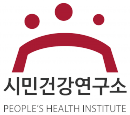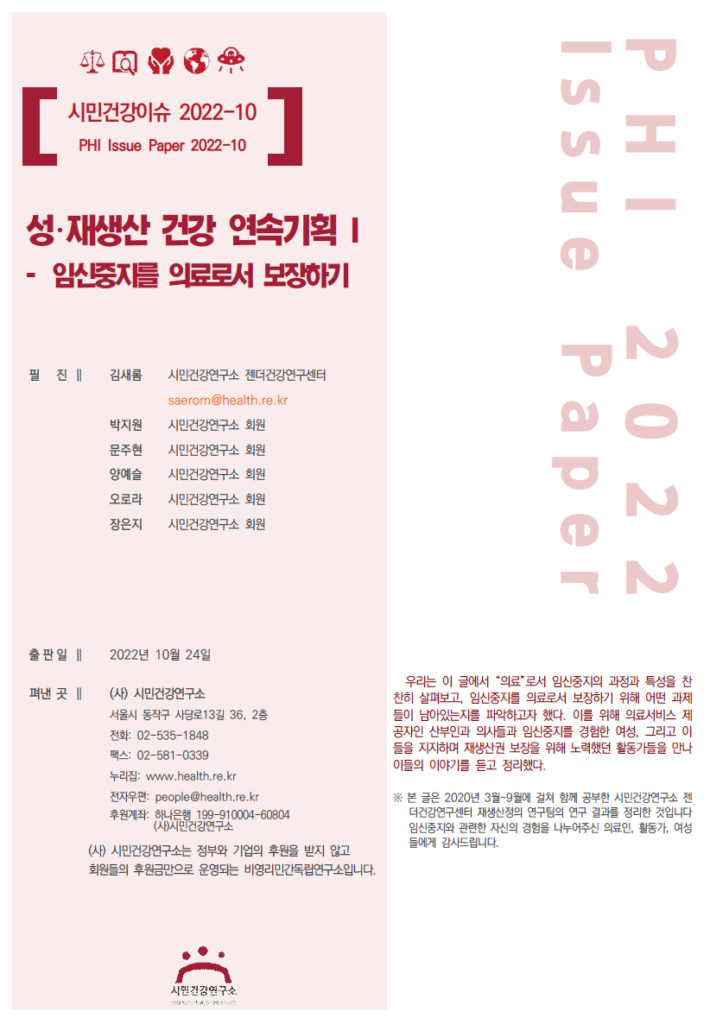시민건강연구소는 회원과 함께 “성·재생산 건강 연속기획 I – 임신중지를 의료로서 보장하기” 제목의 이슈페이퍼를 발간했습니다.
우리는 이 글에서 “의료”로서 임신중지의 과정과 특성을 찬찬히 살펴보고, 임신중지를 의료로서 보장하기 위해 어떤 과제들이 남아있는지를 파악하고자 했습니다. 이를 위해 의료서비스 제공자인 산부인과 의사들과 임신중지를 경험한 여성, 그리고 이들을 지지하며 재생산권 보장을 위해 노력했던 활동가들을 만나 이들의 이야기를 듣고 정리했습니다.
<Summary>
Making Abortion Real in South Korea
-PHI Series on Sexual and Reproductive Health and Rights I
We aim to explore the future task of the reproductive health movement and research securing women’s right to abortion in Korea. To achieve this aim, we interviewed six obstetricians, 11 activists, and 11 women who had gone through abortion themselves in 2020, tracing the process of abortion as healthcare.
We found that abortion care has long been considered a service-that-exists-but-should-not-be-told issue for many healthcare providers due to its illegal status. The neglect of abortion care as a standard healthcare service left many ethical and practical problems unsolved, not to mention the quality of the service itself. Although many parents choose to terminate the pregnancy in the expected case of fetal anomaly, there is no reliable measure to ensure the informed-decision making of parents. In addition, we should consider the context of the active termination of a fetus with congenital anomalies in Korea. The research participants were concerned about two central underlying mechanisms. First, the commercialized technological advancement of the Korean obstetrical care market is the problem as it encourages more and more pregnant women to utilize high-tech antenatal screening tests such as NIPTY. Second, disabling society that does not provide enough resources to live a dignified life for those with disabilities, making their family take the toll. From the provider’s aspect, termination related to abnormal prenatal diagnosis tends to impose ethical strain and pressure on the healthcare providers.
Women who had gone through abortion shared their choice and healthcare utilization experience in Korea. Every woman used the surgical method, even though they wanted a medical abortion as they could not access reliable abortion medication. Abortion access, abortion care, and post-abortion care were nowhere near standardized processes, often making women feel miserable, anxious, and disrespected. Still, participants anticipated the change in the situation by speaking about their experiences.
Activists claim that the cost of an abortion is still a massive problem for many vulnerable groups, especially adolescents and the poor. They contended for women-centered, dignified abortion care, which considers the distinct characteristics of sexual and reproductive healthcare needs. Activists demanded the government and professional organizations include abortion as essential healthcare in their policy and research. They also stressed that responding to the complex healthcare needs of vulnerable women should be prioritized. According to our investigation, we suggest five tasks for the reproductive health movement and Korean society.
First, Abortion care should be considered an essential healthcare service. Therefore, the government should ensure the availability, accessibility, acceptability, and quality of abortion care.
Second, the government and professional organizations should put a special effort into supporting patient-centered consultation and informed-decision making on suspected congenital disabilities. Rather than being swayed by the over-represented late-term abortion by the pro-life politicians and advocators, we should gather the social resource to ease the burden put on women and providers who mull over the termination decision related to congenital disabilities.
Third, the government has to stop discriminating the pregnant women who do not choose to maintain the pregnancy to the childbirth. To ensure everyone’s reproductive rights, the healthcare policies that selectively support would-be mothers should expand their subject to every woman who happens to be pregnant.
Fourth, discrete policy measures to unburden the abortion provider should be arranged. We should not rely on each doctor’s goodwill and commitment but prepare for the patient-centered team of abortion providers.
Lastly, abortion care policy should consider social inequality, which hinders the accessibility of vulnerable groups – such as adolescents, the disabled, migrants, the poor, and rape victims.
※ 본 글은 2020년 3월~9월에 걸쳐 함께 공부한 시민건강연구소 젠더건강연구센터 재생산정의 연구팀의 연구 결과를 정리한 것입니다. 임신중지와 관련한 자신의 경험을 나누어주신 의료인, 활동가, 여성들에게 감사합니다.

